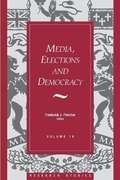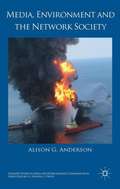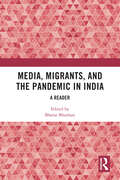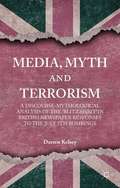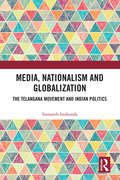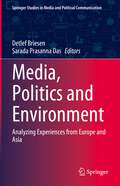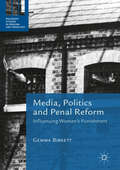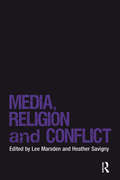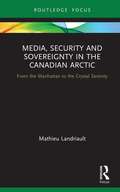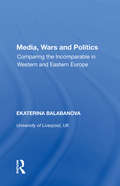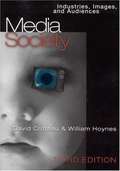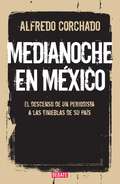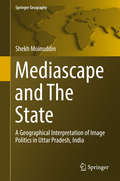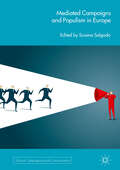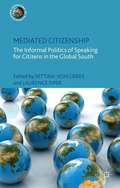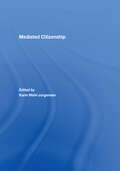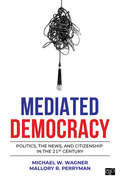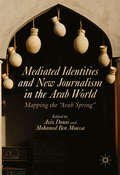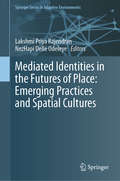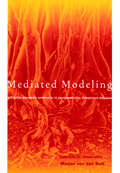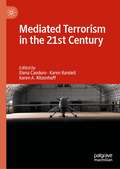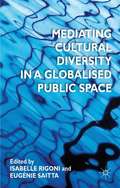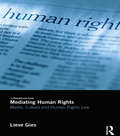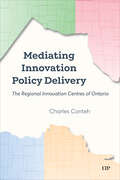- Table View
- List View
Media, Elections, And Democracy: Royal Commission on Electoral Reform
by Frederick J. FletcherMedia, Elections and Democracy examines campaign communication in selected industrial democracies. Klaus Schoenbach, Karen Siune, Doris Graber and a host of authors around the world contribute critical overviews of the systems in their countries. The studies deal with a wide range of issues in modern communication, including the principles and practices of news and public affairs coverage and the impact of new technologies.
Media, Environment and the Network Society
by Alison G. AndersonThe news media has become a key arena for staging environmental conflicts. Through a range of illuminating examples ranging from climate change to oil spills, Media, Environment and the Network Society provides a timely and far-reaching analysis of the media politics of contemporary environmental debates.
Media, Migrants and the Pandemic in India: A Reader
by Bharat BhushanThe national lockdown to contain the COVID-19 pandemic in India resulted in the loss of work and displacement of thousands of urban migrant workers. This book records the arduous journey home for many of these workers and analyses the grave effects the pandemic has had on jobs, livelihoods, and the health of urban migrant workers. A rich compilation of deep analytical articles by journalists, academics, lawyers, and social activists, this book explores various facets of the crisis as it unfolded. It examines the welfare policies of state and central governments and discusses the role of the judiciary and the public policy response to the unemployment, health risks, and mass migration of workers. It also offers readers a better understanding of the complexities of the migrant crisis, how it unfolded, and how it was addressed by the media. This timely and prescient book will be of great interest to the general reader as well as researchers and students of media studies, journalism, sociology, law, public policy, labour and economics, welfare economics, gender studies, and development studies.
Media, Myth and Terrorism
by Darren KelseyMedia, Myth and Terrorism provides a rigorous case study of Blitz mythology in British newspaper responses to the July 7th bombings. Considering how the press, politicians and members of the public were caught up in popular accounts of Britain's past, Kelsey explores the ideological battleground that took place in the weeks following the bombings as the myth of the Blitz was invoked. By providing conceptual discussions of myth, discourse, and ideology, Kelsey proposes a discourse-mythological framework designed for analysing discursive constructions of mythology. In doing so, this research considers multiple recontextualisations of the Blitz myth when popular memories of 1940 recurred in 2005. Kelsey encourages readers to understand the politics of remembering by showing how popular yet inaccurate stories from the past have a significant impact on our perceptions of the present. Heroism, trauma, economics, Royalty, rituals, human rights, foreign policy, immigration and multiculturalism are just some of the topics covered across a vast landscape of stories embracing a myth from the past in order to understand the present.
Media, Nationalism and Globalization: The Telangana Movement and Indian Politics
by Sumanth InukondaThis book explores the meanings of nationalism in a post-globalization, postcolonial context. It provides an in-depth understanding of the relationship between marginalized groups, media and politics by a focused study of the Telangana movement in India. Events like the Arab Spring, unrest in Myanmar and Ukraine, and the Brexit, Kurdish and Catalan referendums have proved how catalytic the changing media environment has been in reshaping the nature of resistance and social movements. Based on the author’s ethnographic research, this book examines how marginalized groups engage with the media and their community to participate in political processes. Analyzing public meetings, folk performances, pamphlets and media reports of the Telangana movement, the author reflects on the cultural notions of nationalism and the politics of state formation in the post-colonial context. This volume also evaluates the role of students and intellectuals in contemporary social movements and in uniting the discontents of globalization. Highlighting intersections of performativity, geography and justice, this book examines changing articulations of identity and everyday forms of resistance. It will be useful for students and research scholars interested in media and communication, cultural studies, political sciences, ethnic and minority studies and sociocultural movements in India.
Media, Politics and Environment: Analyzing Experiences from Europe and Asia (Springer Studies in Media and Political Communication)
by Detlef Briesen Sarada Prasanna DasEnvironmental protection has not equally established itself as a permanent fixture in the political systems of all countries: to date, governments and entire societies have responded to environmental challenges in a variety of ways, and concrete environmental policy is still a highly national matter. Moreover, the perception of environmental problems varies considerably on a global scale. The reasons normally cited for these differences largely stem from the environmental policy debates themselves, e.g. poverty, ignorance, capital interests, etc. In contrast, this book shows that concrete environmental policy emerges from a complex interplay of mass media and political conflicts: first, the mass media provide the framework for national environmental policy through agenda-setting, framing and scandalization; second, the mass media thereby change values in the political and social discourse, e.g. by altering the perception of global commons and expanding the possibilities of interest articulation; and third, this can lead to political decision-making processes in which legal and other measures for environmental protection are enforced. The book systematically compares industrialized countries such as Germany and Japan with several rapidly emerging countries in South and Southeast Asia.
Media, Politics and Penal Reform
by Gemma BirkettThis book examines the nature of relations between penal reform campaigners, journalists and policymakers at the crime-media nexus. With a particular focus on women's penal policy, Birkett uncovers how reform strategies have augmented and developed under changing governments and the news media spotlight. While penal reformers have traditionally relied on the language of humanitarianism to influence the direction of policy, there remains an array of political and cultural sticking points. With a policy-focused orientation, this study provides a number of pragmatic and practical tips for those wishing to think more strategically about their ability to influence politicians, the media and the public. With unprecedented access to over thirty policy elites working around Westminster and Whitehall during the development of the Corston agenda (and beyond), this engaging and timely work exposes the triumphs and tribulations of such actors for the very first time.
Media, Religion and Conflict (Religion and International Security)
by Heather SavignyInternational relations as a discipline has largely ignored the role of religion in shaping international events. The growth of Islamist militancy, the increasing influence of the Christian Right on US foreign policy and George Bush's war on terror changed this for good. Now more than ever we need to analyze this change and consider how religion and the way it is represented affects international politics. Lee Marsden and Heather Savigny uniquely bring together some of the leading figures in the fields of politics and media, international relations and security, and international relations and religion, including freelance journalist and newspaper columnist Nick Cohen, the international authority on politics and religion Professor Jeffrey Haynes, and Professor Justin Lewis who has a number of BBC commissions under his belt. The volume offers a series of case studies reflecting on how the media covers religion as conflict within and between states. It challenges readers to critically examine how media reportage and commentary influences perceptions and responses to religion and security.
Media, Security and Sovereignty in the Canadian Arctic: From the Manhattan to the Crystal Serenity
by Mathieu LandriaultThis book documents how the Arctic region has been represented in the media: exploring how the media has framed the Arctic and whether this has an impact on governmental decision-making and public preferences. The Arctic region faces profound transformations, due to global warming, spurring intense debates about economic growth, environmental protection, and socio-cultural development. At the same time, most of humanity will never come face-to-face with the realities of the region: the media represents our only opportunity to learn about what this evolving region stands for. Recognizing that media coverage will tend to focus on specific events and relay specific messages, this book scrutinizes the nature of these messages to figure out how the Arctic region is presented by different media outlets. Studying different types of media, Landriault conducts an analysis of 628 newspaper articles, 110 televised reports, 9 magazine articles, and 404 tweets to provide the first systematic and rigorous study of Arctic media representations. This book will interest scholars, practitioners, and students in Arctic studies, critical geography, political science, and communication studies.
Media, Wars and Politics: Comparing the Incomparable in Western and Eastern Europe
by Ekaterina BalabanovaThe interaction between media and foreign policy is a critical dimension of the so-called age of 'new military humanitarianism'. The media is now more effective in gathering and distributing information all over the world and media coverage of humanitarian wars allows for information and images to reach a wide audience with great immediacy and realism. For policy making, the 24/7 news cycle means high levels of exposure to fast-breaking international stories receiving global attention and producing a powerful 'do something!' effect. This topical book widens the debate beyond US media and policy making by considering the case of Western and Eastern European media and policy processes. It tests the wider application of existing theoretical approaches and provides useful comparisons, allowing the reader to draw conclusions on the media-policy relationship. It is an excellent resource for all those interested in political communication, European politics and media studies.
Media/Society: Industries, Images, and Audiences
by David Croteau William HoynesPresenting the new edition of their undergraduate-level textbook, Croteau (sociology and anthropology, Virginia Commonwealth U.) and Hoynes (sociology, Vassar College) discuss the social components of the mass media and highlight the tension between constraint and action. Their analysis is based on a social model that sees media as being part of multidimensional process of complex interaction between audiences, technology, medial message, and media industry, all operating within the wider context of the social world. Annotation c. Book News, Inc., Portland, OR (booknews.com)
Medianoche en México: El descenso de un periodista a las tinieblas de un país en guerra
by Alfredo CorchadoUn periodista sigue la pista de diversos cárteles de la droga en México, hasta que su propia vida es puesta en predicamento. Es medianoche en México, 2007. Alfredo Corchado recibe una llamada telefónica de su fuente principal para informarle que hay un plan para asesinarlo por parte de un poderoso capo. Pronto averigua que lo quieren matar porque uno de sus artículos en el Dallas Morning News afectó los sobornos que los narcotraficantes entregan a policías, militares y funcionarios del gobierno mexicano. Así comienza el viaje en espiral de un hombre que busca descifrar la compleja situación del país mientras lucha por salvar su vida. A pesar de recorrer un camino de múltiples encrucijadas, desigualdad y violencia extrema, Corchado, "infectado con la enfermedad incurable del periodismo", no se resigna a abandonar la esperanza en tiempos turbulentos. Ahora, el líder del brutal cártel que lo perseguía, el Z-40, está detenido, pero la historia no haterminado de escribirse. "Este libro habla sobre las sangrientas fronteras que dividen los dos países de Alfredo Corchado -México y Estados Unidos- y que han regido su propia vida. Con el telón de fondo de la terrible y violenta guerra contra las drogas que ha convertido a México en una tierra de sepulcros, Corchado comparte su propia historia y la de su familia de manera conmovedora, honesta y aguda." -JON LEE ANDERSON, autor de Che Guevara, una vida revolucionaria "Un sutil y conmovedor testimonio que servirá a cualquiera que desee entender a México desde sus profundidades y cómo es afectado -legal e ilegalmente- por Estados Unidos." -JOHN WOMACK JR., autor de Rebelión en Chiapas "Alfredo Corchado es el tipo de reportero y escritor que nos hace recuperar la fe en el periodismo." -TRACY KIDDER, Premio Pulitzer, autor de La fuerza de lo que queda
Mediascape and The State
by Shekh MoinuddinThis book investigates image politics during elections and how the political discourse is reflected during the Uttar Pradesh assembly elections in 2012 by the media and the state. It reveals new dimensions of media geography in India and makes image construction and interpretation easy to comprehend. This interdisciplinary approach is located at the interface of geography with social, political, cultural, and media sciences. The book draws a geographical interpretation of politics to reveal the role of both media and the state to shape the political discourse with special focus on the privileged position of the "heartland" Uttar Pradesh in Indian politics. It studies the "mediascape" by highlighting application of media in both public and private spheres and discussing the importance of both old and new media, e. g. , print, radio, TV, social media. Several crucial aspects are discussed and answered. How do media and politicians construct politics around the issue of minorities? How do media communalize issues during the election campaign? How can local issues gain national importance and shape national politics? This book appeals to scientists but also to graduates and postgraduates that want to understand the way image politics are performed.
Mediated Campaigns and Populism in Europe (Political Campaigning and Communication)
by Susana SalgadoThis book analyses the coverage of elections that occurred between September 2015 and February 2016 in six European countries (Greece, Portugal, Poland, Croatia, Spain and Ireland). The sample examined includes all news stories published during the official electoral campaign in different types of media outlets: three newspapers per country covering centre-left and centre-right wing political leaning, as well as reference and tabloid papers; three main television news broadcasts covering commercial/private and public broadcast television channels; and three papers that are published only online, taking into account their levels of audience and importance within each national media and political system. The book also examines different connections to the EU and to the Euro Crisis. Questions such as the following guide the overall analysis: In what ways is news election coverage similar and different in these countries? Which issues are mostly covered by the news media and how? Are there patterns of election news coverage in these six European countries? This book is indispensable reading for researchers and students in the field of the media coverage of election campaigns, political communication and populism.Chapters 4 and 8 are available open access under a Creative Commons Attribution 4.0 International License via link.springer.com.
Mediated Citizenship
by Bettina Von Lieres Laurence PiperDrawing on case studies from the global South, this book explores the politics of mediated citizenship in which citizens are represented to the state through third party intermediaries. The studies show that mediation is both widely practiced and multi-directional and that it has an important role to play in deepening democracy in the global South.
Mediated Citizenship
by Karin Wahl-JorgensenPreviously published as a special issue of Social Semiotics, this book grapples with such questions as: What does it mean to be a citizen in contemporary societies? What role do mass media play in the making of citizenship? Drawing on ground-breaking work from scholars around the world known for their contributions to the study of media and politics, this volume covers a range of practices of mediated citizenship, with chapters studying the mourning after the deaths of Pim Fortuyn and Theo van Gogh in the Netherlands and notions of authenticity in letters written to British Conservative politician Boris Johnson. The authors explore discourses of nationalism in the English and Scottish Press, and examine struggles over definitions of the public in Australian public service broadcasting and the US Medicare debate. Emerging possibilities for mediated citizenship are assessed in three studies of online activism and participation in the US and China. The book builds on conventional understandings of citizenship and the public sphere, calling attention to the need for understanding affective attachments to politics. Finally, it demonstrates that we cannot fully understand citizenship without looking at the concrete workings of power in and through mediated discourse.
Mediated Democracy: Politics, the News, and Citizenship in the 21st Century
by Michael W. Wagner Mallory R. PerrymanMediated Democracy: Politics, the News, and Citizenship in the 21st Century takes a contemporary, communications-oriented perspective on the central questions pertaining to the health of democracies and relationships between citizens, journalists, and political elites. The approach marries clear syntheses of cutting-edge research with practical advice explaining why the insights of scholarship affects students’ lives. With active, engaging writing, the text will thoroughly explain why things are the way they are, how they got that way, and how students can use the insights of political communication research to do something about it as citizens.
Mediated Democracy: Politics, the News, and Citizenship in the 21st Century
by Michael W. Wagner Mallory R. PerrymanMediated Democracy: Politics, the News, and Citizenship in the 21st Century takes a contemporary, communications-oriented perspective on the central questions pertaining to the health of democracies and relationships between citizens, journalists, and political elites. The approach marries clear syntheses of cutting-edge research with practical advice explaining why the insights of scholarship affects students’ lives. With active, engaging writing, the text will thoroughly explain why things are the way they are, how they got that way, and how students can use the insights of political communication research to do something about it as citizens.
Mediated Identities and New Journalism in the Arab World
by Aziz Douai Mohamed Ben MoussaThis book looks into the role played by mediated communication, particularly new and social media, in shaping various forms of struggles around power, identity and religion at a time when the Arab world is going through an unprecedented period of turmoil and upheaval. The book provides unique and multifocal perspectives on how new forms of communication remain at the centre of historical transformations in the region. The key focus of this book is not to ascertain the extent to which new communication technologies have generated the Arab spring or led to its aftermaths, but instead question how we can better understand many types of articulations between communication technologies, on the one hand, and forms of resistance, collective action, and modes of expression that have contributed to the recent uprisings and continue to shape the social and political upheavals in the region on the other. The book presents original perspectives and rigorous analysis by specialists and academics from around the world that will certainly enrich the debate around major issues raised by recent historical events.
Mediated Identities in the Futures of Place: Emerging Practices and Spatial Cultures (Springer Series in Adaptive Environments)
by Lakshmi Priya Rajendran NezHapi Dellé OdeleyeThis book examines the emerging problems and opportunities that are posed by media innovations, spatial typologies, and cultural trends in (re)shaping identities within the fast-changing milieus of the early 21st Century.Addressing a range of social and spatial scales and using a phenomenological frame of reference, the book draws on the works of Heidegger, Merleau-Ponty and Don Hide to bridge the seemingly disparate, yet related theoretical perspectives across a number of disciplines. Various perspectives are put forward from media, human geography, cultural studies, technologies, urban design and architecture etc. and looked at thematically from networked culture and digital interface (and other) perspectives.The book probes the ways in which new digital media trends affect how and what we communicate, and how they drive and reshape our everyday practices. This mediatization of space, with fast evolving communication platforms and applications of digital representations, offers challenges to our notions of space, identity and culture and the book explores the diverse yet connected levels of technology and people interaction.
Mediated Modeling: A System Dynamics Approach To Environmental Consensus Building
by Marjan van den Belt Thomas DietzMediated modeling is an innovative new approach that enhances the use of computer models as invaluable tools to guide policy and management decisions. Rather than having outside experts dispensing answers to local stakeholders, mediated modeling brings together diverse interests to raise the shared level of understanding and foster a broad and deep consensus. It provides a structured process based on system dynamics thinking in which community members, government officials, industry representatives, and other stakeholders can work together to produce a coherent, simple but elegant simulation model. Mediated Modeling by Marjan Van Den Belt is a practical guide to participatory modeling for both practitioners and students, one that is firmly theoretically grounded in the field of systems dynamics and environmental modeling. Five in-depth case studies describe the successful use of the technique in a variety of settings, and a final chapter synthesizes the lessons highlighted by the case studies.Mediated Modeling's step-by-step description of the techniques and practical advice regarding implementation offer a real-world solution for all those seeking to make sound decisions about the environment.
Mediated Terrorism in the 21st Century
by Karen Randell Karen A. Ritzenhoff Elena CaoduroMediated Terrorism in the 21st Century offers new interpretations of figures emerging from representations of terrorism and counterterrorism: the male hero, female agent, religious leader, victim/perpetrator, and survivor. This collection of essays by a broad array of international scholars reflects the altered image-making processes that have developed from George W. Bush’s “war on terror.” Building on current literature on media and terrorism, this volume analyzes the most recent technological developments that have impacted the way we experience terrorism: online videos, social media, cartoons, media feeds, and drones. The authors address different time periods, different terrorist groups, and explore the way filmmakers and television producers from the USA, Europe, South Africa, and the Middle East are documenting modern wars in popular culture.
Mediating Cultural Diversity in a Globalized Public Space
by Isabelle Rigoni Eugénie SaittaThrough enhancing reflection on the treatment of cultural diversity in contemporary Western societies, this collection aims to move the debate beyond the opposition between ethnicity and citizenship and demonstrate ways to achieve equality in multicultural and globalised societies.
Mediating Human Rights: Media, Culture and Human Rights Law
by Lieve GiesDrawing on social-legal, cultural and media theory, this book is one of the first to examine the media politics of human rights. It examines how the media construct the story of human rights, investigating what lies behind the apparent media hostility to human rights and what has become of the original ambition to establish a human rights culture. The human rights regime has been high on the political agenda ever since the Human Rights Act 1998 was enacted. Often maligned in sections of the press, the legislation has entered popular folklore as shorthand for an overbearing government, an overzealous judiciary and exploitative claimants. This book examines a range of significant factors in the mediation of human rights, including: Euroscepticism, the war on terror, the digital reordering of the media landscape, , press concerns about an emerging privacy law and civil liberties. Mediating Human Rights is a timely exploration of the relationship between law, politics and media. It will be of immense interest to those studying and researching across Law, Media Studies, Human Rights, and Politics.
Mediating Innovation Policy Delivery: The Regional Innovation Centres of Ontario
by Charles ContehReport cards and academic scholarship have been critical of innovation policy in Canada. But what if these reports have done a profound injustice to the story of knowledge-driven economic reinvention and the actual transformation taking place in the country? Spotlighting what is happening in cities and regions across Ontario, Mediating Innovation Policy Delivery argues that it is far more nuanced and exciting than what has been captured in scorecards and report cards. The book explores the intermediary institutions, the organizational brokers at the frontline of Canada’s innovation race, that are shepherding the process of economic reinvention in regions large and small. The book draws on case studies to explore three central themes. The first is about innovation, innovation policy, and their delivery systems. The second is that of regions as the frontlines of technological and socioeconomic change in the Canadian federation. The third covers the role of intermediary institutions as innovation platforms, highlighting their triumphs and tribulations as they strategically navigate through the shifting currents of change. The book’s main lessons apply not just to Ontario and Canada but also to other industrialized democracies worldwide. Ultimately, the book advances our knowledge of organizational instruments of innovation policy delivery that operate at the strategic interface between the state, market, and society.
